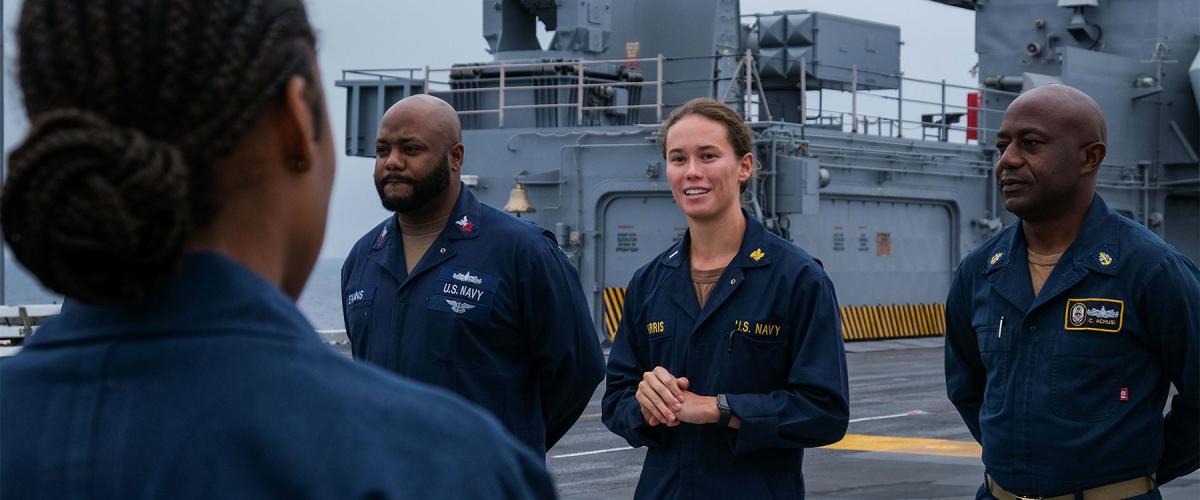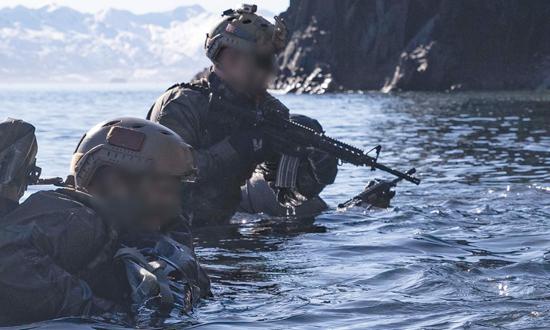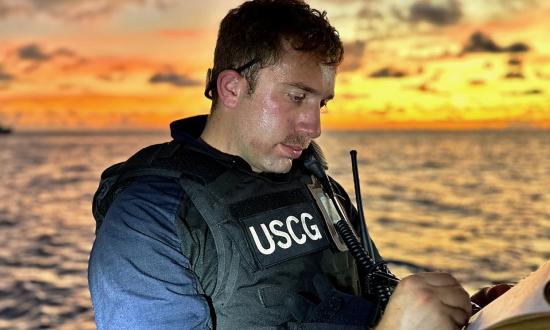Junior officers (JOs) face a great challenge from the moment they commission: holding the authority of rank without the experience that merits credibility. Fortunately, a JO’s success is often measured by his or her ability to manage timelines, foster relationships, and communicate expectations up and down the chain of command—none of which require subject matter expertise alone. While technical knowledge is a worthy goal, officers are called to the greater task of becoming leaders of character.
The demand for character in leadership is paramount within military service; the distinction as the “profession of arms” is important. A profession constitutes a field with a high level of training, credentialed certification, and—unlike many other jobs and careers—a code of ethics. Character drives the ethical code of the U.S. armed forces, which revolves around the disciplined pursuit of goodness in word, deed, and effort for our organization, our sailors, and ourselves.
A JO who does not work to become a leader of character risks serious consequences for his or her unit. When JOs fail to become engaged leaders, they may instead settle into the role of administrative figurehead. From my experience as a division officer, two major archetypes can develop: the indifferent JO and the absent JO. Indifferent JOs, guided by timidity or apathy, resign themselves to maintaining the system rather than delving into their unit’s conflicts and seeking solutions. Absent JOs lack presence, which forces their unit to bridge the gap in decision-making and information dissemination.
These archetypes degrade the chain of command and deny unit cohesion. They are undisciplined and self-serving, the antithesis of a leader of character. Both categories must be avoided. While it is tempting to consider this a problem for new or disenchanted JOs, no one is immune to complacency. Anyone may find themselves absent or indifferent from time to time. Luckily, these temperaments do not have to be permanent. With intent, personal desire, and a focus on the role’s core tenets, any JO can become and remain a leader of character.
Be Curious
Curiosity serves as the bedrock of learning in both the technical and personnel aspects of the job. For maintenance, a willingness to review manuals and drawings will contribute to an individual’s knowledge. Similarly, a great phrase for JOs to incorporate is, “Can you show me?” Sailors operate complex systems with nuanced procedures. While insight can be gained from office discussions, no conversation replaces crawling over, under, or wedging between equipment in tight spaces to see what is broken and understand the plan for repair.
The same is true for discovering personnel issues and creating meaningful connections with your sailors. By observing, engaging, and listening, both their abilities and needs will become apparent. Once, I overheard my female sailors discussing their “long trek to the head.” I probed for details and learned they did not have the aft head code and walked all the way forward whenever nature called. An aircraft carrier is about as long as the Empire State Building is tall! Here, a little curiosity resulted in a quality-of-life improvement for the women in my division.
The absent JO is blind to occurrences like this, even though the issue was simply resolved and helpful to the team. An engaged leader’s interest and effort will establish credibility and enable him or her to better represent the unit when appealing to the chain of command for support.
Be Involved
It is not enough to merely be aware of the team’s routines and issues; a leader of character must be a key player in daily operations and conflict resolution. The Navy’s Standard Organization and Regulations Manual uses phrases such as “by personal supervision and frequent inspection,” “responsible for all administration,” “ensure[s] optimum material readiness,” and “directs operation” to describe the responsibilities of a division officer. To lead effectively, a JO must have a firm grasp on every facet of the unit’s operation through active involvement. The indifferent JO may consider these tasks the domain of the senior enlisted leaders. Though the chiefs and leading petty officers will be catalysts, JOs are responsible for information and verifying task execution.1
A fellow division officer recently discovered a serious casualty because of diligent involvement. When reviewing watch stander logs, high trending values for a major piece of equipment were apparent. Others had noticed the trends but dismissed the data, pointing to a “faulty sensor,” and refrained from further investigation. Investigation revealed that the casualty had initiated days before and required immediate attention. Active participation revealed a major discrepancy and prompted corrective actions to provide for the safety of the ship.
Though not all JOs are division officers in title, the need for vigorous involvement applies to every leadership position. A high level of awareness and investment is required to run a unit properly.
Enforce Standards
Standard enforcement, or lack thereof, shapes the culture of any team. The first step toward growing a positive culture of compliance begins with fluency in and demonstration of Navy, community, and command regulations. Your example sets the tone and stage for future accountability. The next step is fair and consistent corrections to violations. Of course, this refers to uniform wear, grooming, and behavior, but also—and more importantly—procedural compliance, work ethic, and character.
The quality of a person’s work is an extension of their true self. If a disconnect exists between the values of the command and the team, a leader cannot be confident that those efforts were carried out free of ulterior motives or processes.
The U.S. Naval Academy’s infamous 1994 cheating scandal offers a good example. Of the 133 students implicated, 11 were found guilty of cheating on their 2/C Electrical Engineering exam. While some midshipmen violated the institution’s integrity standard outright, others failed to hold their peers accountable. The result was a violation of personal honor, compromise of the exam’s validity, and a loss of public trust in the Academy’s ability to develop officers worthy of their commissions.
The success of mission accomplishment sours quickly when achieved by dishonorable, unsafe, or unfair means. Here, the indifferent or absent JO stands idly by, accepting that the culture “is the way it is.” A leader of character steps in and addresses improper practices to align the principles of the team and command.
Own Failure
Failure remains an unavoidable and pivotal tool for fostering proficiency and strengthening unit cohesion. Generally, people are uncomfortable with failing. While being “right” makes people feel pleased, wise, and proud, being “wrong” often elicits anger, embarrassment, or sadness.3 Challenge yourself to view failure as a valuable learning mechanism when paired with comprehensive analysis and course correction.
You will encounter failure both personally and in group settings. A technique of indifferent JOs is to take the failure’s consequences on the chin, shrug it off, and go back to business as usual. Owning failure does not mean becoming the sacrificial lamb or accepting it as an inevitable, unfixable thing. When addressing violations or incidents for yourself or with the unit, encourage truthfulness, problem identification, and effective corrective actions. Tell the whole story when reporting to superiors, outline contributing weaknesses, and propose appropriate solutions.4 A willingness to own failure provides endless opportunities to self, team, and command for continued growth.
Be Authentic
Authenticity allows personal preferences and experiences to enhance an individual’s leadership style. Leading authentically can be challenging, however, when military culture and stigmas can imply the need for a specific demeanor in its authority figures. In addition, workplace relationships in the seagoing services are complex. When underway, seniors, peers and subordinates all work and live in a shared space for extended periods. In this environment, an individual must always remain professional. However, this leads to the mistaken conclusion that leaders must remain serious, strict, and unexpressive. Effective leadership can manifest in a range of dispositions, interests, and behaviors.
As a first-tour division officer, I worked with a small group of information system technicians. For several months, my bridge watch overlapped with daily quarters, and I noticed a sharp decrease in the amount of face time I had with my sailors. Since afternoon tea is a hobby of mine, I offered to host a “teatime with divo” event. To my surprise, they attended regularly and commented if we skipped a meeting. My personal interests served as a fruitful medium to foster relationships and unit camaraderie.
Thankfully, maintaining professionalism and being authentic do not elementally conflict with one another. Professionalism means treating all people respectfully, compliance with established policies, and conducting oneself appropriately for the workplace. Once those conditions are met, the personal interpretation and execution of the role is limitless and essential to confident, strong leadership.
Go Forth
As junior officers, we are expected and obligated to serve as leaders of character for the betterment of ourselves, our units, and the Sea Services. A prudent new JO will strive to create habits that reflect the cornerstones of leading with character. Midterm and seasoned JOs would similarly benefit from sincere retrospection and reinvigoration. In a case in which reflection indicates absence or indifference, allow the journey to begin now. If character is made in the disciplined pursuit of goodness, then dusting yourself off, refocusing, and getting back on the horse is both a good and honorable act.
1. Personal communication with author, Rickover (27 June 1969).
2. Personal communication with author, Richardson (14 August 2015).
3. Kathryn Schulz, Being Wrong: Adventures in the Margin of Error, reprint edition (New York: Ecco, 2011).
4. Personal communication with author, Rickover (10 January 1967).






